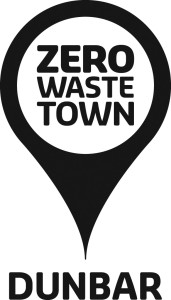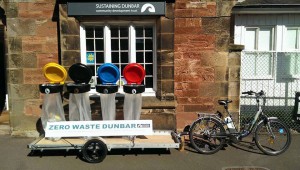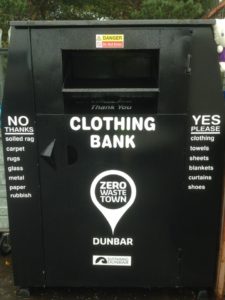The Zero Waste Dunbar (ZWD) Project ran from September 2014 to March 2017 as a pilot community engagement initiative, which aspired to accelerate the implementation of Scotland’s Zero Waste Plan in the Dunbar Ward by 2025.
Scotland’s Zero Waste Plan sets out the Scottish Government’s vision for a zero waste society.
This vision describes a Scotland where:
- Allwaste is seen as a resource;
- Waste is minimised; valuable resources are not disposed of in landfills; and,
- Most waste is sorted; leaving only limited amounts to be treated.
The ZWD Project Objectives were designed to engage with Schools, Households, Businesses, East Lothian Council and relevant stakeholders to enable all to:
- get a better understanding of what their waste is made up of now;
- identify ways and take action to reduce their waste;
- identify ways to reuse their waste;
- identify ways to recycle more;
- identify ways to benefit more from our waste as a local resource; and
- identify ways to develop a local circular economy
Zero Waste Scotland Indicators of success by March 2017:
- Recycling rate moving towards 70%
- High uptake of food waste collections rolled out by ELC
- Increase of re-use activity within the community
- Schools actively engaged with the 4 Rs – Redesign; Reduce; Reuse; Recycle
- Improved knowledge of waste reduction, recycling and resource efficiency amongst businesses
The ZWD Projects delivered to achieve the community engagement objectives:
- Marketing Zero Waste Dunbar
- Be Zero Support
- Go Zero Challenge
- Recycling on the Go
- Food Waste Reduce, Reuse and Recycling
- Zero Waste Shed
- Zero Waste Textile Banks
- Reuse Hub
The following documents the aims and objectives of each project, outcomes and lessons learned.
Marketing Zero Waste Dunbar: The aim of this project was to effectively communicate why Dunbar is Scotland’s 1St Zero Waste area, what this means and how people living in Ward 7 can get involved.
Objectives: To reach as wide a cross section and as many people as possible.
How this objective was achieved:
- Development of ZWD Website, Face book, Twitter and Pinterest accounts;
- Employed a local Press Officer (PJ Designs) to design and deliver a ZWD flyer to every household in Ward 7 and to write project press releases;
- Open public meetings and meetings with stakeholders/ local groups;
- Meeting with people face to face where ever they could be found e.g. on the streets, door to door, at local shops, school assemblies and events, Local Gala’s and events etc.; and
- ZWD Swap Shop events and reuse workshops.
Our Starting Point: By April 2015 very few people knew we had been awarded Scotland’s 1st Zero Waste Town status and even fewer understood what that implied.
Outcomes:
- We have active ZWD Face book pages (2,600+ members), twitter and website and have engaged with over 6000 residents (face to face, door to door, via events and via the ZWD Hub) in our Ward.
- We gathered local baseline information, views and ideas from which we could get a better understanding of people’s views of what being a zero waste area means and to record their ideas and aspirations for moving forward.
- We gathered local baseline data from which to measure change overtime.
- Getting out meeting with people at local events and door to door widened engagement to households, age and gender and enabled the project to start where people were at with regards to waste reduction, reuse and recycling.
- The ZWD project was adopted and Zero Waste aims endorsed by the Local Area Partnership – Zero Waste Town principles and aspirations now form part of the Local Area Plan.
- Swap Shops and reuse workshops were well attended and widened engagement with and understanding of the project.
- Signs indicating we are Scotland’s 1St Zero Waste Town installed at the entrances into Dunbar along the A1
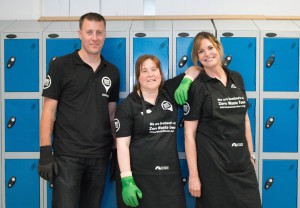
Be Zero Support: The aim of this project was to provide a local one stop service to support our residents and businesses to reduce, reuse and recycle more of their waste.
Objectives: to engage with Schools, Households, Businesses, East Lothian Council and relevant stakeholders to enable all to:
- get a better understanding of what their waste is made up of now;
- identify ways and take action to reduce their waste;
- identify ways to reuse their waste;
- identify ways to recycle more;
- identify ways to benefit more from our waste as a local resource; and
- identify ways to develop a local circular economy
Out Starting Point: East Lothian Council had just started to roll out the new household and business waste services including a new food waste capture programme in April 2015.
Outcomes:
- The ZWD office was a steady flow of people calling in to get advice and support.
- We worked in partnership with ELC to support their household and business waste collection service including the new food waste collection which started April 2015
- All 6 of our Schools now have the infrastructure and systems in place to carry out full recycling, including a food collection service. An estimated 29,253.6 kgs will be diverted away from landfill this year!
- Dunbar Grammar School (owned by private business) has gone from no recycling to a full recycling system installed and funded by ZWD project and serviced by ELC.
- The new food waste service at schools will be able to divert approximately 30,000 KG of waste annually
- Waste audit findings indicate a 52% decrease in waste going to landfill from our schools. These findings and lessons learned have been shared with all 6 schools and ELC Education.
- We built positive relationships with our local businesses and are members of the Dunbar Traders Association
- We connected business with Zero Waste Scotland departments and specialists to try and find ways they could benefit / add value to their waste streams.
- A Zero Waste Business Pack was developed and distributed to all our business in our ward to give them information about their waste management responsibilities and how they can get support to reduce, reuse and benefit more from their waste. ELC has adopted the Zero Waste Business Pack and will now distribute throughout the county.
- A 5 Star Awards system was designed for Businesses. The aim of this award scheme was to enable businesses to communicate with the public that they are playing their part and committed to becoming a Zero Waste Town.
- We secured additional funding to employ a consultant (Simon Glover) to develop a feasibility study to get a better understanding local waste as a local resource.
- We funded Dunbar Fashion School £2,000. to support them to develop a line of fashion from recycled textiles for London Fashion Week
- We funded our 4 local primary schools £4,000. to develop their Playpods
- We funded over £8,000. Worth of recycling infrastructure for our 6 local schools
- We have a very good relationship with ELC Waste Services who will support the aspects of the ZWD Project legacy moving forward beyond March 2017.
What we learned
- Starting where people are at is essential to moving forward to be a Zero Waste area
- The starting points are different from household to household, street to street, school to school, business to business.
- There is no one solution that fits all.
- Full co-operation of the local authority was central to the success of this project
- Seconding our Business Officer from ELC Waste Services – accelerated progress in ways, that would not have been possible otherwise.
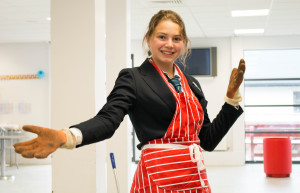
Go Zero Challenge: The aims of the Go Zero Challenge programme was to facilitate schools, households and business to assess where they are at with regards to their waste streams and enable them to plan and act to reduce, reuse and recycle more.
Objectives:
- to engage with all of or 6 local schools and carry out waste audits and develop actions plans with them
- to engage with all local businesses to offer waste audits and action plans
- To get an understanding of where each school, household and business were ‘at’ and to tailor engagement and solutions to meet the individual and unique situations
- To encourage all schools, households and businesses to take the Go Zero Pledge which we designed to facilitate progressive action towards zero waste to landfill.
Our Starting Point: Our 6 local schools had very limited recycling facilities and no food waste capture service. Our Households and business were just starting to learn about the new ELC waste services being rolled out in April 2015.
Outcomes:
- All 6 schools participated in the Schools Zero Waste Challenge with 270 pupil’s making the Go Zero Pledge
- 218 households out with the school population made the Go Zero Pledge
- 120 local businesses made the Go Zero Pledge
Lessons Learned:
- All of our schools and most of the households and businesses we engaged with were really keen to move towards being a Zero Waste Town.
- Very few people (10 out of 3000) indicated they would only be driven to go the extra mile to zero their waste if they could see the rational of “what’s in it for us” and had an expectation that interventions should provide a return, financial or otherwise. For example “if we reduce the amount of waste going to landfill then will this be reflected in our council tax?”
- Creating an environment in which it is possible to develop new partnerships and responses is central to success and in two years we have succeeded to facilitate this to happen.
Recycling on the Go: The aim of this project was to make it easy for people to recycle where ever they were out and about our ward.
Objectives: To meet with relevant ELC departments to understand why the waste capture infrastructure is the way it is and to find ways to change infrastructure to capture separate waste streams on our High Streets and in our parks.
Our Starting Point: Our High streets, parks and leisure facilities had single capture waste bins.
Outcomes:
- The Recycling on the Go Bike Trailer was a very useful and fun way to make it easy for people to recycle at events across the ward and to get a visual understanding of what waste streams were arising.
- Carried out waste audits and action plans for various events and leisure facilities.
- Providing the Recycling on the Go service at local events through the early stage of the project helped us to raise the profile of the project and to engage with wide cross section of the public.
- Installing clear recycling bins for separate waste stream capture for Dunbar Harbour.
- The local authority level economies of scale and logistics were the main drivers for the current waste management systems and this underpins uniform solutions at the expense of diversity in locally appropriate or bottom up solutions. For this reason we were not able to replace single mixed waste capture on our High Streets and parks with separate capture-recycling bins as planned. Our only way forward was support the Local Area Partnership to lobby for a full recycling service for High Streets in our area.
Lessons Learned:
- Creating an environment in which it is possible to develop new partnerships and responses is central to success and in two years we have succeeded to facilitate this to happen.
- Most of the people we engaged with were really keen to be able to recycle on the go.
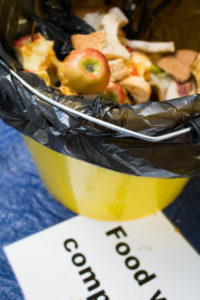
Food Waste Reduce, Reuse and Recycle: The aim of this project was to support local households, schools and business to reduce, reuse and compost food waste.
Objectives: To enable households, schools and businesses to
- understand what their food waste is
- Develop action plans and ways to reduce, reuse and compost more.
Our Starting Point: ElC had just started to roll out the new food waste capture service for households. Very few households knew why this service was needed or desirable.
Outcomes:
- Food Waste Collection Survey door to door and out and about with households and businesses to help people understand reational behind the new service and to record their likes, dislikes and ideas for improving the service and reported our findings to ELC.
- Facilitated the new food waste collection service at our 6 schools will divert approximately 30,000 KG of food waste annually
- Go Zero Challenge Pledge with Schools and Households. Over 200 households, 6 schools and 120 businesses participated in the Go Zero Challenge to reduce all waste (including food waste) to landfill.
- 120 Local cafes and restaurants signed up to the Good to Go scheme
- Funded a freezer an dehydrator for the Ridges Hungry Hatch initiative
- Funded a freezer for Sunny Soups initiative
- Commissioned Dunbar Community Shed to build 10 worm boxes which were donated to the Backlands Community Food Waste Composting pilot
- Funded £500. To Dunbar Primary School to develop a food waste reuse trial with their Chicken Coop.
Lessons Learned:
- There is still a stigma around composting food waste and the fear of attracting rodents;
- People generally liked and appreciate the value in the ELC food waste collection service
- There is some reluctance from ELC to promote food waste composting due to health and safety regulations but indicated an interest in Wormeries.
- The combination of a food dehydrator and freezer can extend the local value of food from restaurants and super markets which otherwise would have gone to landfill.
- The barrier to the sustained uptake of Good to Go was the perceived cost of the bags and containers. Businesses need more information from ZWS about the benefits to business of the Good to Go scheme.
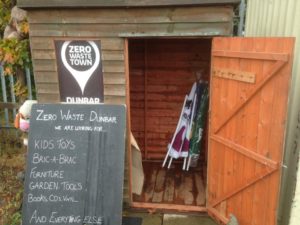
Zero Waste Shed: The aim of the Zero Waste Shed was to set up a capture facility at Dunbar Recycling Centre to divert waste away from landfill for local reuse.
Objectives:
- To work with ELC to intercept waste streams entering Dunbar Recycling Centre before going into the landfill skips
- To gauge the local populations interest in being able to access various waste streams
- To divert waste for local reuse
- To measure weights diverted away and returned back to landfill to evidence success
Our Starting Point: There was no waste diversion for reuse operation in our ward.
Outcomes:
- Viridor funded a 20 foot “Zero Waste Shed” which was established on our local HWRC. ZWD Volunteers met with people at the Dunbar HWRC to communicate Zero Waste messages and this project was a great success – making it easier for residents to divert waste away from landfill for reuse and manufacturing.
- The ZWD Project has diverted over 34 tons of waste away from landfill and 12831 kgs of textiles for reuse in 6 months.
- We have a very good relationship with ELC Waste Services who will support aspects of the ZWD diversion and reuse project legacy moving forward beyond March 2017.
- The Local Area Partnership funded the lease of the ZWD Van for the first 6 months of the waste capture trial and based upon its success they have granted an additional 12 months funding to extend the van lease beyond March 2017.
- We now have waste diversion operations in place for the ZWD reuse legacy in our ward.
ZWD Textile Bins The aim of the Textile Bin project was to explore ways the community could benefit from local textiles going into local banks before they are taken out of the area by rag merchants.
Objectives:
- To purchase ZWD Textile banks and locate them around Dunbar
- To experiment with ways to give community access to reusable clothing / shoes
- To develop a sustainable model moving forward beyond March 2017
Starting Point: Textiles in the charity textile banks in our locality were of no value to our communities and reusable clothing and rag was shipped out of the area.
Outcomes:
- Working in collaboration with ELC Waste Services 5 textile bins were purchased, branded as Zero Waste Dunbar and installed in key locations.
- Textile Banks captured 12,831 kgs of textiles in 6 months
- Working in collaboration with Simon Glover we trialled the ‘Big Pick’ which was a huge success and will be rolling out across ELC beyond March 2017 to alleviate clothing poverty
- A sustainable model was tested and will be rolled out through East Lothian Council beyond March 2017.
Lessons Learned:
- Full co-operation of the local authority was central to the success of this project
- Textile Banks can bring local benefit into an area in the form of revenue from rag
- Textile Banks can benefit local communities to alleviate clothing poverty

Reuse Hub: The aim of the Zero Waste Reuse Hub was to pilot ways to enable sustained community access of waste for reuse beyond March 2017.
Objectives:
- To pilot a model developed by Simon Glover to sustain waste capture and diversion activities locally.
Our Starting Point: Communities could not access waste going to landfill from our Recycling Centre.
Outcomes:
- A “Zero Waste Hub” was established on Spott Road in Dunbar which was used to communicate Zero Waste messages and was a great success – making it easier for residents to waste for reuse and manufacturing.
- The ZWD Project has diverted over 34 tons of waste away from landfill and 12831 kgs of textiles for reuse in 6 months.
- 15 tons of waste was diverted to local schools, groups and for charity fund raisers.
- We built positive relationships with our local businesses and are members of the Dunbar Traders Association
- We have a very good relationship with ELC Waste Services who will support the aspects of the ZWD Project legacy moving forward beyond March 2017.
- Dunbar now has sustainable, self funding waste diversion and reuse operations in place as one of Zero Waste Dunbar’s major project legacies in our ward.
Lessons Learned:
- Seconding our Business Officer from ELC Waste Services – accelerated progress in ways, that would not have been possible otherwise.
- Full co-operation of the local authority was central to the success of this project
- Communities Resource Network Scotland CRNS provided useful and practical support to our project.
- Having a Project Board with representatives from Zero Waste Scotland, ELC Waste Services, CRNS and Sustaining Dunbar ensured we had affective guidance and support for the project from start to finish
